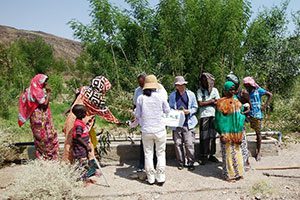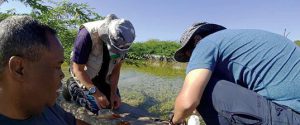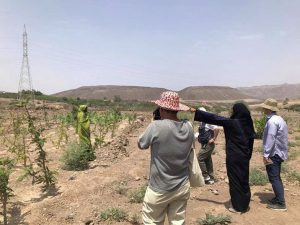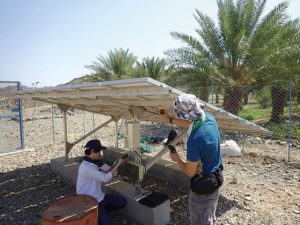Project Summary
Establishing a method of sustainable and efficient water resources management and utilisation in Djibouti!

Prof. Shimada interviewing the farmers at a local farm in Djibouti Source: JST Website (https://www.jst.go.jp/report/2019/190417.html)
Djibouti, one of the countries located in the Horn of Africa region, has severe climate conditions. The annual precipitation is only 50 to 200 millimetres, and the maximum temperature in summer exceeds 40 degrees Celsius. In Djibouti, the agricultural sector contributes merely 3% of Gross Domestic Product (GDP)*, and only a few work in the farming sector. Most of the foods consumed by the people are imported from neighbouring countries.
The “Research Project on Advanced and Sustainable Methods on Water Utilization Associated with Greening Potential Evaluation in Djibouti” was started in fiscal year 2018 by Tokyo University of Agriculture in collaboration with University of Djibouti for 5 years under SATREPS**, a research programme supported by JST (Japan Science and Technology Agency) and Japan International Cooperation Agency.
This project aims to establish efficient and sustainable methods of water utilisation and management of arid lands and to disseminate sustainable agro-pastoral practices in Djibouti’s extremely harsh natural environment. The outcome of this research is to contribute to two (2) Sustainable Development Goals (SDGs): Goal 2, or “promote sustainable agriculture” and Goal 6, or “ensure availability and sustainable management of water and sanitation for all”.
* FAO 2009 http://www.fao.org/family-farming/detail/en/c/289319/
** For more information on SATREPS, please click here
Project Details
Project Purposes
There are two main purposes of this research project:
1. Assessment of water resources / greening potential and demonstration of agro-pastoral practices
- Fact-finding onsite interviews at a demonstration farm in the Arta Region
- Measuring power output and panel temperature to analyse efficiency of a solar pumping system at a progressive farm in Dikhil
Source: SATREPS Website (https://www.jst.go.jp/global/english/kadai/h3002_djibouti.html)
Most areas of Djibouti have harsh desert environment, and the country’s food self-sufficiency ratio is as low as about 13 per cent. The first purpose of the project is to assess potential (i.e., in terms of distribution and circulation systems) and sustainable usage levels of water resources all over Djibouti, and to establish and expand areas where agro-pastoral practices are feasible by evaluation using a three-dimensional water resource perspective.
Assessment of the present situation is carried out by examining the relationship between water resources and potentials for greening and livestock carrying capacity using satellite and UAV images over the whole area of Djibouti.
2. Efficient use of water resources to enhance land sustainability by greening barren lands and by creating agro-pastoral areas
The second purpose of the project is to identify and promote optimal practices for greening and to extend sustainable agro-pastoral farming system for arid lands through actual demonstrations. The process involves trial and evaluation of all the water-saving irrigation techniques and groundwater pumping systems in pilot farmlands.
The project also aims to propose water-saving agro-pastoral models, as an extension of the oasis farming model, by producing high-valued plants and feeding crops along with soil amelioration and greening through the effective use of cultivated algae or urban wastes.
Project activities

Sampling to identify algae growing in water tanks at a test farm in Damerjog Source: SATREPS Website (https://www.jst.go.jp/global/english/kadai/h3002_djibouti.html)
This project consists of five research themes as indicated below:
1) Development of a water cycle simulation model and creation of a water resource potential map
2) Evaluation of potentials for land productivity considering carrying capacity and expansion of agricultural practices
3) Management of pilot farm for sustainable agro-pastoral practices
4) Economic evaluation for land restoration
5) Dissemination of good practices for sustainable and efficient water resources utilisation
Websites
・ Create sustainable agro-pastoral practices in the Djibouti desert through developmental management of water resources : https://www.jst.go.jp/global/english/kadai/h3002_djibouti.html
The information contained in this article was written by AI-CD Secretariat based on information which is publicly available without consent of each source for the purpose of introducing Japan’s cooperation. AI-CD Secretariat does not guarantee that there will be no errors in the contents of this article, and disclaims any liability for errors and omissions or for any damages accruing from the use of this article. The article also includes contents, links, other information, and translated material provided by third-parties for which AI-CD Secretariat claims no responsibility.
Written by Ayaha MOCHIZUKI,
AI-CD Secretariat Support Team



